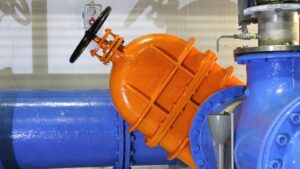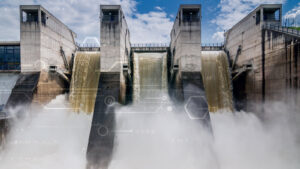The water treatment industry in Australia is not something to take lightly, as it produces more than 80 million megalitres of water per year for industrial and household use. If one little mistake in this industry will jeopardise the whole water supply the end user’s life will be impacted heavily due to that. This is why the Australian water treatment industry always opts for cutting-edge technology to minimise such errors that can occur during operations inside water treatment plants. ‘Supervisory Control and Data Acquisition’ or in short ‘SCADA’ is one such tool that has gained much popularity over these years as one of the best approaches to ensure water quality and unchallenged water supply.
In this article, we will look into the employment of SCADA in the water treatment realm and the best benefits of the latter to revolutionise water production and supply inside Australia.
In this article, we will look into the employment of SCADA in the water treatment realm and the best benefits of the latter to revolutionise water production and supply inside Australia.
What is a 'SCADA System'?

- Let us first introduce the true essence of the SCADA system as the starting point for this article. It is a control system architecture used in industries to monitor and manage processes, infrastructure, and industrial machinery. It combines software, hardware, and communication networks to gather real-time data and control operations remotely.
- The SCADA system’s power cannot be limited as it spreads throughout the whole process. The operators are powered to visualise, interact, and make informed decisions based on the collected information through this SCADA system. They oversee diverse functions like manufacturing, power generation, water treatment, and more, ensuring efficiency, safety, and reliability.
- With capabilities for data analysis and remote control, SCADA systems optimise processes and enhance productivity while maintaining operational integrity in various critical infrastructures and industrial settings.
- However, the SCADA system cannot stand tall in the technological realm without the support of other integrated software. This integrates with complementary software like PLCs (Programmable Logic Controllers) and HMI (Human Machine Interface) software to offer the best for any industry. PLCs collect data from sensors and actuators on machinery, transmitting it to the SCADA system.
- The SCADA system then visualises this data, allowing operators to monitor and manage processes. Plus, it often communicates with other tools for data processing and storage in order to provide thorough insights and historical trend analysis.
Top 5 Benefits of SCADA System for the Water Treatment Industry

Early Fault Detection
SCADA systems have become a main player in early fault detection within the water treatment industry due to their power to continuously monitor and analyse data from sensors and equipment. These systems track various parameters such as water flow rates, pressure levels, pH levels, and chemical concentrations in real-time.
An alarm or warning is sent out instantly if any specific requirements are violated. With the help of this quick reaction mechanism, operators can quickly identify potential challenges or irregularities in the treatment process and take preventative action.
As you can see, when you have such an early fault detection system in place, you receive the ability to prevent minor glitches from escalating into critical system failures. It also helps with minimising downtime and the risk of compromising water quality. SCADA allows quick repair and corrective measures by identifying issues at their earliest stages, ensuring the reliable and continuous operation of water treatment plants.
An alarm or warning is sent out instantly if any specific requirements are violated. With the help of this quick reaction mechanism, operators can quickly identify potential challenges or irregularities in the treatment process and take preventative action.
As you can see, when you have such an early fault detection system in place, you receive the ability to prevent minor glitches from escalating into critical system failures. It also helps with minimising downtime and the risk of compromising water quality. SCADA allows quick repair and corrective measures by identifying issues at their earliest stages, ensuring the reliable and continuous operation of water treatment plants.
Integration Capabilities
Another benefit of SCADA is that it provides remarkable integration capabilities that are flawlessly connecting diverse components within the treatment infrastructure. While interfacing with various sensors, actuators, Programmable Logic Controllers (PLCs), and additional monitoring devices, SCADA consolidates a comprehensive overview of the entire treatment process. This means full-scale coverage of the water treatment operations within a short period.
Due to this unity, operators can monitor and control many parameters at once by centralising the gathering and analysis of data from various sources. On the other hand, effective decision-making is highly encouraged by the system’s capacity to interact with various hardware and software components, which offers a single interface for data visualisation and control.
Such connectivity helps gather critical information from different parts of the treatment facility, which consolidate into a singular interface, enhancing operational efficiency as well. It also simplifies management and backs up the swift response initiatives to changes or anomalies in the treatment process.
Due to this unity, operators can monitor and control many parameters at once by centralising the gathering and analysis of data from various sources. On the other hand, effective decision-making is highly encouraged by the system’s capacity to interact with various hardware and software components, which offers a single interface for data visualisation and control.
Such connectivity helps gather critical information from different parts of the treatment facility, which consolidate into a singular interface, enhancing operational efficiency as well. It also simplifies management and backs up the swift response initiatives to changes or anomalies in the treatment process.
Data Analysis & Reporting
How can you make accurate inspections and wise decisions if you do not receive enough precise information about each important aspect of the water treatment plant? As we mentioned above, SCADA is a software consolidation that collects a massive amount of data every second, which is then processed and analysed to generate comprehensive insights.
SCADA helps operators see trends, spot patterns, and anticipate possible problems by monitoring variables, including water quality, flow rates, chemical dosages, and equipment statuses.
This understanding of each element is highly useful for the SCADA system to create detailed reports and visualisations for you, offering a clear depiction of system performance, compliance adherence, and process efficiencies. These full-scale reports assist in regulatory compliance, providing valuable information for authorities while empowering internal decision-making processes.
With its data analysis and reporting capabilities, SCADA clears the way for you to have a thorough understanding of every aspect of your water treatment plant without making any mistakes, which ultimately helps you to make outstanding and justified decisions.
SCADA helps operators see trends, spot patterns, and anticipate possible problems by monitoring variables, including water quality, flow rates, chemical dosages, and equipment statuses.
This understanding of each element is highly useful for the SCADA system to create detailed reports and visualisations for you, offering a clear depiction of system performance, compliance adherence, and process efficiencies. These full-scale reports assist in regulatory compliance, providing valuable information for authorities while empowering internal decision-making processes.
With its data analysis and reporting capabilities, SCADA clears the way for you to have a thorough understanding of every aspect of your water treatment plant without making any mistakes, which ultimately helps you to make outstanding and justified decisions.
Increased Safety
You know that no industry can go without taking safety measures to ensure their workforce is protected within the water treatment premises. Australia puts a lot of weight on this matter as the industrial accident rates are rising day by day. However, did you know that SCADA is an outstanding strategy to back up your safety measures if implemented correctly? Yes. The latter significantly helps to ensure employee and infrastructure safety within the water treatment industry through continuous monitoring and control of critical parameters. When overseeing variables such as pressure, chemical levels, and equipment statuses in real time, SCADA ensures that operations remain within safe limits.
Let us explain how this is possible. When this technological consolidation spotted any change, it set off instant alarms, helping workers to react quickly to potentially dangerous situations or unusual circumstances. As you can see, with SCADA in hand, your employee safety is enhanced by 200% through this proactive monitoring, which, on the other hand, reduces the risk of environmental risks, equipment breakdowns, and accidents.
Another benefit is that due to SCADA’s ability to remotely control processes, operators can now intervene from a safe location if necessary. No longer need to visit the location manually, and this remote inspection helps minimise direct exposure to some risky situations. Water treatment facilities nowadays rely heavily on SCADA to reduce threats, protect employees, and keep a safe working environment through its alertness and quick response systems.
Let us explain how this is possible. When this technological consolidation spotted any change, it set off instant alarms, helping workers to react quickly to potentially dangerous situations or unusual circumstances. As you can see, with SCADA in hand, your employee safety is enhanced by 200% through this proactive monitoring, which, on the other hand, reduces the risk of environmental risks, equipment breakdowns, and accidents.
Another benefit is that due to SCADA’s ability to remotely control processes, operators can now intervene from a safe location if necessary. No longer need to visit the location manually, and this remote inspection helps minimise direct exposure to some risky situations. Water treatment facilities nowadays rely heavily on SCADA to reduce threats, protect employees, and keep a safe working environment through its alertness and quick response systems.
What is a 'SCADA System'?

If you were hesitating to employ SCADA for your water treatment plant, now you might understand that there is nothing to worry about, considering the benefits it can offer you. Why should you go with various software and hardware when you can easily streamline your operations with just one singular platform? When you purchase this technology, our friendly reminder is to align all the challenges you encounter with the features of the potential system. With the right technology from a reputed provider, your journey will be unlimited for sure!







